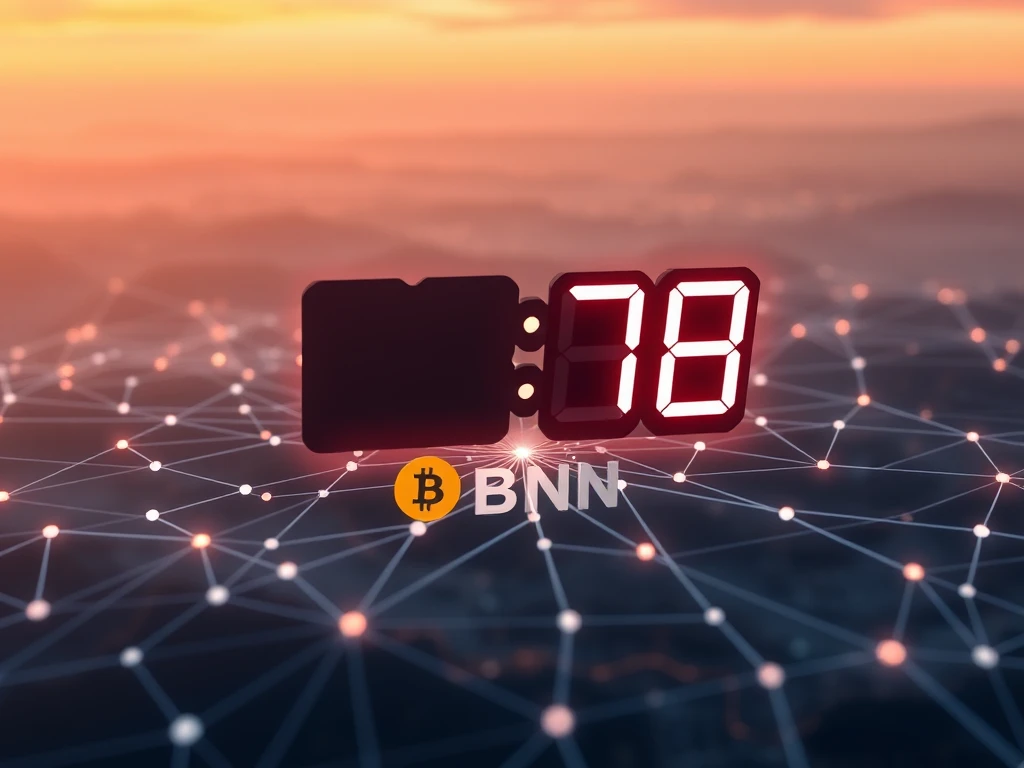BNB Smart Chain Achieves Rapid 0.8s Block Times After Maxwell Upgrade

Attention, crypto community! The BNB Smart Chain has just achieved a significant milestone that could redefine speed and efficiency on the network. Following the successful implementation of the highly anticipated Maxwell upgrade, average block times have seen a dramatic reduction, falling below one second. This development is crucial for anyone building on, transacting on, or simply interested in the future of the BNB Smart Chain.
What Does the Maxwell Upgrade Mean for Block Time?
The Maxwell upgrade for the BNB Smart Chain was designed with a clear goal: to significantly enhance network performance. A key target of this hard fork was to cut the average block time in half. Previously sitting at around 1.5 seconds after the Lorentz upgrade in April, the network has now achieved an average block time of just 0.8 seconds following the Maxwell implementation.
This reduction in block time has immediate implications:
- Faster Transactions: Users can expect quicker confirmation times for their transactions.
- Responsive DApps: Decentralized applications built on the BNB Chain should feel snappier and more fluid.
- Lower DeFi Latency: Decentralized finance protocols benefit from reduced delays in data processing and execution.
The BNB Chain team highlighted that this upgrade is a technical leap forward, aiming for faster blocks, improved validator coordination, and smoother overall network performance.
Exploring the Key BEP Proposals in Maxwell
The Maxwell upgrade wasn’t just about speed; it encompassed several technical improvements outlined in specific BNB Evolution Proposals (BEPs). The hard fork included three main BEP proposals aimed at boosting scalability, validator synchronization, and overall network efficiency.
Let’s break down the core BEPs:
- BEP-524: This proposal was the primary driver for reducing the block time. Building on the previous Lorentz upgrade, which brought block times down to 1.5 seconds, BEP-524 further optimized the process to target the sub-second block time.
- BEP-563: Focused on improving peer-to-peer messaging among validators. The goal was to enable faster block proposal communication, create a more stable validator network, and minimize the risk of missed votes or synchronization delays. This is essential for maintaining consensus speed at lower block times.
- BEP-564: Introduced new message types to enhance network synchronization speed. Specifically, the GetBlocksByRangeMsg allows requesting multiple recent blocks in a single call, while RangeBlocksMsg returns them all in one response. This significantly improves how quickly new nodes or validators can sync with the current state of the BNB Smart Chain.
These BEP proposals work together to ensure that while the block time is faster, the network remains stable, efficient, and reliable.
Impact and Preparation for Developers and Validators
With the BNB Smart Chain operating at significantly faster block times, developers and validators needed to prepare for the change.
- Developers: Were advised to test their decentralized applications under the tighter block timing. Any logic relying on the previous 1.5-second intervals needed review and potential refactoring. The message from the team was clear: if something breaks, it’s likely an issue with the application’s code adapting to the new speed, not the underlying chain itself.
- Validators: Had to ensure their systems were benchmarked and capable of handling the increased message throughput and faster consensus cycles required for a 0.75-second target block time.
This proactive approach helps maintain the stability and functionality of the ecosystem built upon the BNB Chain.
BNB Price Reaction Leading Up to Maxwell
The native token of the BNB Chain, BNB, saw positive price movement in anticipation of the Maxwell upgrade. In the week leading up to the hard fork, BNB’s price increased by approximately 6.5%, trading within a range of $617 to $655. Following the upgrade, the token continued to trade around the $655 mark, showing a slight increase in the 24 hours after the implementation.
While the price reacted positively, BNB remains below its all-time high, indicating potential room for growth if the network improvements translate into increased adoption and activity.
Conclusion: A Faster Future for BNB Smart Chain
The Maxwell upgrade marks a pivotal moment for the BNB Smart Chain. By successfully reducing block times to a remarkable 0.8 seconds, the network has taken a significant step towards enhancing user experience, developer capabilities, and overall efficiency. The strategic BEP proposals addressing validator communication and network synchronization lay the groundwork for a more robust and scalable platform. This technical advancement positions the BNB Chain favorably in the competitive blockchain landscape, promising a faster, more responsive future for its growing ecosystem.







